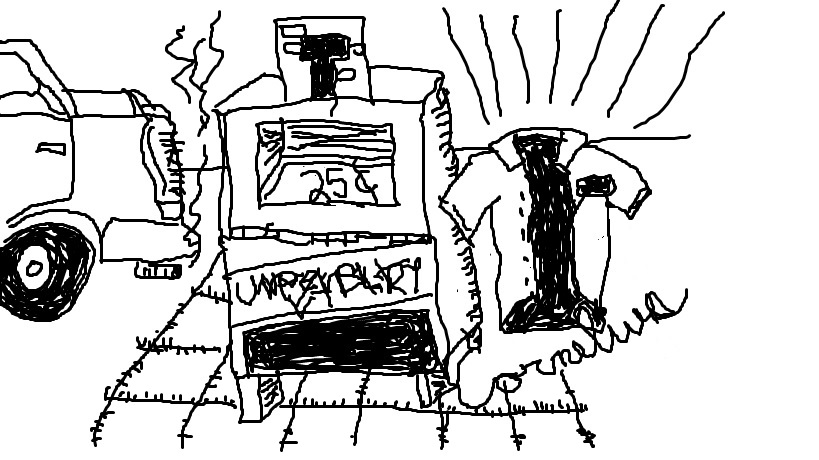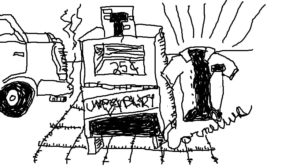
Cornelius
Me and Dunable were raiding the racks at Goodwill, searching for cheap clothes to wear to school that fall, when I came across a faded blue work shirt with a white patch over the left breast pocket, where the name CORNELIUS had been spelled out in red cursive stitching. The shirt set me back three bucks, but it ended up being too long and too tight around my middle, so I bequeathed it to Dunable. He looked the part of a Cornelius, with his already-scraping six-foot frame and the fu-manchu mustache he had been growing experimentally all summer, two dark tufts sprouting just above the corners of his mouth. His voice was also a couple octaves deeper than mine, which wasn’t surprising given that he was a full year older than me, thirteen to my twelve, all because he’d taken the long and scenic route through third grade.
We spent the rest of the summer lurking in gas station parking lots all across the mid-Missouri college town where we lived, waiting for gullible-looking customers to pull up to the pumps. At first, we gravitated toward the easy targets, the ones that fit a certain profile: country bumpkins, absentminded professors, foreign-exchange students. Gradually, Dunable began to favor a more nuanced approach, although neither of us could say exactly what it was he looked for. Something in the person’s face, maybe–a certain lack of light in the eyes, or an extra wrinkle in the brow. “There’s one,” he would say, pointing to a man in a business suit standing next to a BMW and squinting at his gold watch like it had just dropped straight down out of the blue and lashed itself to his wrist. And before I could protest, Dunable had already untied the shirt from the handlebars of his bike, plunged his long arms into its sleeves, and loped halfway across the parking lot to confront the customer.
“Excuse me,” “Cornelius” would say, looking and sounding official, “but this is now a full-service station.”
More often than not, our flustered mark would step aside and allow Dunable to fill up the tank himself. While the gas was pumping, Dunable would pop the hood, making like he was checking the engine. “Oil looks fine,” he would tell the customer. “But you might want to talk to your regular service provider about a new filter.” He’d glide around the car, swabbing at the windows with a cleaning solution and wiping them down with a squeegee he’d pulled from a bin by the pump. Once the fuel pump shut off, Dunable would re-rack the nozzle, sidle up to the driver’s side window, and collect his payment. We split the earnings—technically, I was supposed to serve as lookout, although if I’m being honest, the only person I ever paid any attention to during these transactions was Dunable. People seemed pleased with the job he did, and often tipped handsomely. Sometimes, though, a customer only had a credit card, which drew a broad-shouldered shrug from Cornelius. “You’re gonna have to go talk to the gal at the counter,” he would sigh, a deep exhale that feathered the tips of his fu manchu. While our stooge went inside to deal with the unsuspecting clerk, we’d jump on our bikes and haul ass out of there.
We couldn’t have gotten away with a stunt like this nowadays. Nearly everybody carried cash back then, before the advent of pay-at-the-pump and magnetic stripe readers. But it wasn’t just that–folks back home are meaner and more paranoid than they used to be. They still say “ope” when they bump into you, but make no mistake, they’re not sorry about anything.
By mid-August, Dunable’s exploits had made the front page of the local college newspaper, a fairly big deal because the j-school was highly-ranked nationally, and many of its graduates moved on to big media markets instead of sticking around to cover the metro beat for the glorified coupon-wrapper here in town. Dunable read the article out loud to me as we slumped against the brick wall outside Schnuck’s grocery store, sipping sweaty Gatorades in the scorching heat. “Authorities are investigating reports of an adult Caucasian male impersonating a gas station attendant,” Dunable intoned in a fake-Joe Friday voice, which sounded an awful lot like his normal speaking register. Though factual, the tone of the entire piece was firmly tongue-in-cheek, and it wasn’t hard to see how impressed the student media was with our scheme.
I wasn’t mentioned anywhere in the write-up, which should’ve filled me with relief, but only made me jealous. After all, I was the one who’d made everything possible by buying the shirt in the first place. It also irked me the way the story kept referring to Dunable as an “adult”–as if I wasn’t already self-conscious enough about my short stature, baby-soft cheeks, and squeaky voice. But even if the shirt had fit, it wouldn’t have transformed me the way it had Dunable. It would’ve turned me into what I already was: an utterly unmemorable child, dressed in hand-me-down clothes that were as exhausted and colorless as the future that was yawning open in front of him.
“Get a load of this shit,” Dunable was saying. He read on, quoting one of his anonymous victims: “‘I have to say, the guy was good. Courteous, thorough, very service-oriented. Gosh, I sure hope they catch him.’”
Dunable folded the paper in half and let it plop onto the concrete. He looked over at me with a strange, almost anguished expression on his face, like he was trying to figure out if I was his best friend, or his only friend. Then, as though he’d suddenly decided the answer didn’t matter, he hopped to his feet and mashed another quarter into the newspaper dispenser.
“These fucking things are free on campus and twenty-five cents everywhere else in town,” he told me, reaching in to grab a stack of papers. “They deserve to get stolen.”
